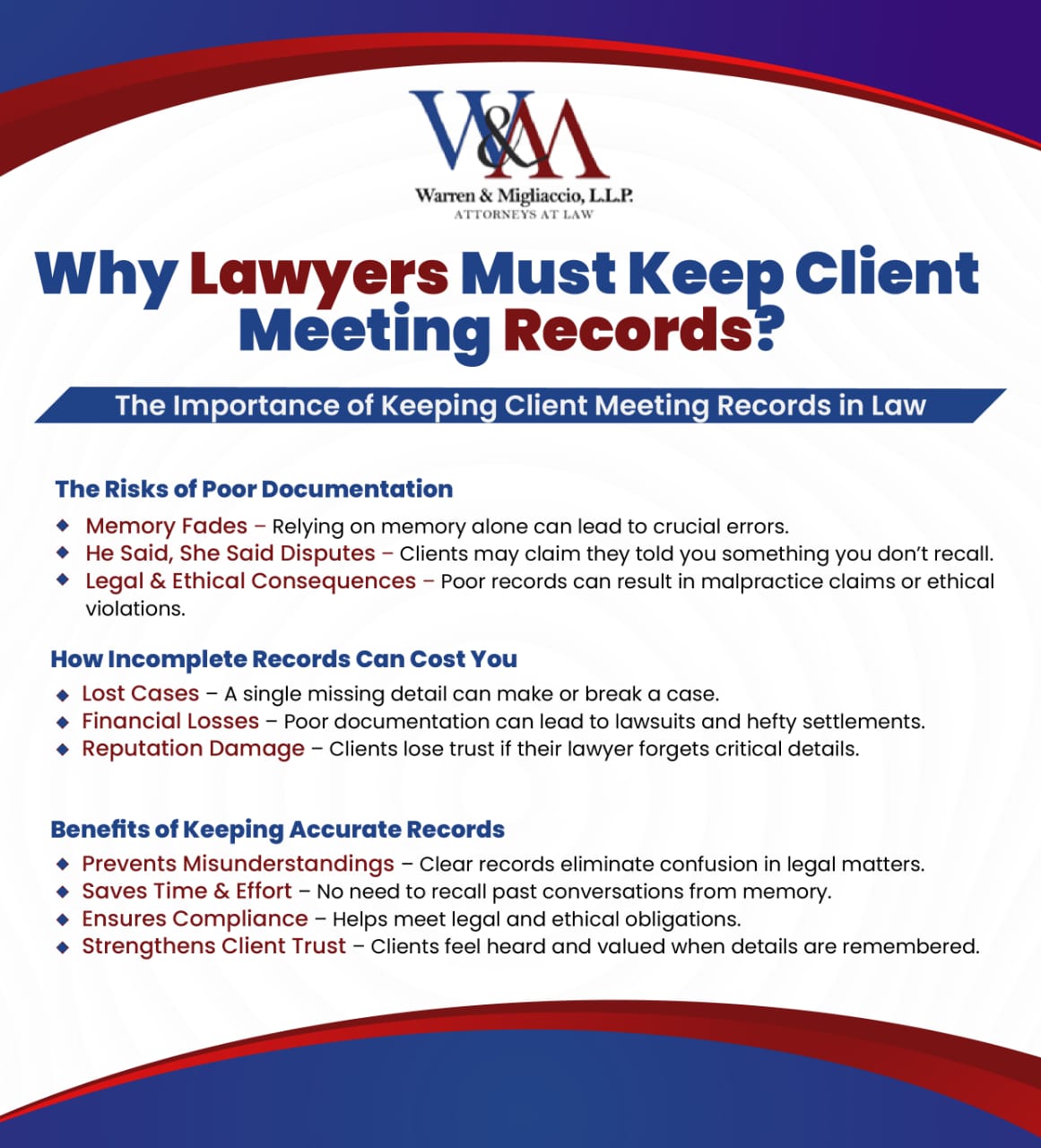
Have you ever entered a room and found yourself unable to recall your purpose for being there? Imagine going through the same thing in a courtroom, and it can be nerve-racking.
Lawyers juggle thousands of conversations, case information, and legal subtleties. Being dependent on memory alone or hasty scribbles is akin to trying to contain water in your palms—something will slip away. In the legal system, those moments of distraction cost cases, reputations, and even licenses.
Clients expect you to remember every detail they share, down to the exact words they use. Miss a detail, and you might misunderstand their case, overlook essential facts, or worse, find yourself facing a malpractice claim.
So, what’s the solution? Keeping crystal-clear client meeting records of every consultation. Not only does it protect you, but it ensures your clients get the best representation possible. Let’s talk about why that’s non-negotiable.
The Risk of “He Said, She Said” in Legal Consultations
Have you ever had a client swear they told you something… but you have zero recollection of it? Welcome to the gray area of legal work—where memories clash, and no one wins.
This is precisely why many law firms use recordings. Ditto helps law firms transcribe accurately, enabling lawyers to concentrate on clients instead of scratching furiously on paper. With accurate notes, there’s no second-guessing what’s been said, who said it, or what was promised and what wasn’t.
Having verbatim records means no “he said, she said” disputes. If a client claims they instructed you to file a motion and you remember otherwise, you don’t have to rely on memory—you have proof. It’s a safety net that prevents misunderstandings (and possible lawsuits).
Legal Ethics and Professional Responsibility: Why Accuracy Matters
Lawyers have an impossible standard set before them. Your clients want you to be a walking encyclopedia, but ethics rules anticipate that you should also be a detail-oriented record keeper.
Poor documentation isn’t merely frustrating—it’s risky. It can contribute to ethical breaches, misrepresentation, or even terminations. Any talk you have with a client is potential evidence. If you don’t document it properly, you might get in trouble.
In addition to being annoying, careless documentation can be harmful. Misrepresentation, ethical transgressions, or even disciplinary action may result from it. Every conversation you have with a client is potential evidence, and if you don’t document it correctly, you could find yourself in hot water.
Once, a lawyer lost a malpractice case because their notes were too unclear to prove they had given a client enough advice. According to the court’s decision in support of the client, “if it’s not documented, it didn’t happen.”
Maintaining accurate records is not only morally required but also an excellent practice. A precise record of customer contacts is essential for compliance, accountability, and peace of mind.
How Poor Documentation Can Lead to Big (Expensive) Mistakes
Legal mistakes don’t always come from bad arguments—they often stem from bad records. And bad records can cost millions.
Picture this: A law firm loses a wrongful termination case because an attorney’s notes on a crucial meeting were incomplete. The client insists they provided vital evidence. The lawyer insists they don’t remember that. The judge sides with the client.
Consider this in a high-stakes business case or criminal defense trial. Bad records can blow an entire case, resulting in lost settlements, wrongful convictions, and substantial liability claims.
Law firms operate on details. One wrong date, a missing document, or a misremembered statement can be the difference between winning and losing. If you don’t have an airtight record, you’re playing a risky game—and the house always wins.
Efficiency and Time-Saving: Why Smart Lawyers Keep Better Records
Let’s be honest: Lawyers don’t have time to play detective in their conversations. When a client asks, “Remember when we discussed X?” you shouldn’t have to dig through a mountain of notes, emails, or (worst of all) your memory. With well-kept records, the answer is fast, accurate, and indisputable.
Competent firms keep records not just for compliance but also to save time. Detailed transcripts, recordings, and case notes mean less time wasted on follow-ups, fewer misunderstandings, and smoother workflows.
Think of it like this: If you spend an hour a week trying to recall past conversations, 52 hours a year—more than an entire workweek—wasted on something that could have been solved with better documentation. Time is money, and no lawyer can afford to waste it either.
The Human Side: Clients Expect to Be Heard and Understood
Clients want more than legal advice—they want to feel heard. Nothing breaks trust more quickly than an attorney forgetting essential facts about his case.
Picture sitting down with your lawyer, only to have them hardly remember your tale. Frustrating, yes? That’s how clients feel when you rely on memory alone. Keeping precise records shows clients that their concerns matter and that you’re invested in their case.
Beyond professionalism, it’s about building trust. Clients don’t always communicate clearly and might contradict themselves over time. With a detailed record, you can reference their own words, helping them stay consistent while reinforcing that you’ve been paying attention all along.
In short, maintaining clean records is not only a good practice—it’s a moral imperative. An accurate client contact record is not optional for compliance, accountability, or peace of mind.

Lawyers, are you keeping accurate client records? If it’s not documented, it didn’t happen. Avoid legal disputes, save time, and build trust with clear, detailed records.
Conclusion on The Importance of Keeping Client Meeting Records
Law isn’t just about knowing statutes and case law—it’s about precision. Precision starts with keeping a clear, detailed record of every client interaction.
Inadequate documentation frequently results in legal problems, misunderstandings, and errors. One of the best things a lawyer can do to guarantee accuracy, avoid expensive mistakes, and improve client relations is to keep thorough records.
Don’t do it the next time you believe you’ll “just remember” anything crucial. Document it. Because in law, the difference between winning and losing often comes down to what’s on record—and what isn’t.
